 |
1 |  | 
1. The Cell Theory states that |
|  | A) | a. cells are the basic unit of life |
|  | B) | b. all cells arise from preexisting cells |
|  | C) | c. all organisms are composed of cells |
|  | D) | d. all of the above |
|  | E) | e. only a and c |
 |
 |
2 |  | 
2. The cell wall is formed by the nucleus and consists of primary, secondary, tertiary, and quaternary walls. |
|  | A) | True |
|  | B) | False |
 |
 |
3 |  | 
3. The principal component of the cell wall is |
|  | A) | a. cellulose. |
|  | B) | b. glycoproteins. |
|  | C) | c. lignin. |
|  | D) | d. pectin. |
|  | E) | e. protein. |
 |
 |
4 |  | 
4. Plasmodesmata |
|  | A) | a. allow for movement of materials between cells. |
|  | B) | b. are flattened sacs used for protein storage. |
|  | C) | c. contain chromatin. |
|  | D) | d. all of the above. |
|  | E) | e. Both a and b |
 |
 |
5 |  | 
5. Which of the following best describes the fluid mosaic model? |
|  | A) | a. Cytoplasmic bridges move materials through cell pits. |
|  | B) | b. Pinching off of membranous sacs for protein assemblage. |
|  | C) | c. Vesicles and microtubules accumulate across the center of a dividing cell. |
|  | D) | d. Double layer of phospholipids with scattered proteins. |
|  | E) | e. Double layer of proteins with scattered phospholipids. |
 |
 |
6 |  | 
6. Microtubules and microfilaments make up the Golgi apparatus and are involved in lipid formation. |
|  | A) | True |
|  | B) | False |
 |
 |
7 |  | 
7. Plastids that contain starch are called _________, whereas those that contain red and yellow pigments are called_________. |
|  | A) | a. chromoplasts, leucoplasts |
|  | B) | b. amyloplasts, chromoplasts |
|  | C) | c. leucoplasts, chloroplasts |
|  | D) | d. chloroplasts, amyloplasts |
|  | E) | e. chloroplasts, leucoplasts |
 |
 |
8 |  | 
8. Which organelle is composed of cristae and a matrix? |
|  | A) | a. chloroplast |
|  | B) | b. nucleolus |
|  | C) | c. mitochondrion |
|  | D) | d. central vacuole |
|  | E) | e. nucleus |
 |
 |
9 |  | 
9. The chloroplast is the site of photosynthesis, whereas the mitochondrion is the site of cellular respiration. |
|  | A) | True |
|  | B) | False |
 |
 |
10 |  | 
10. A cell may become plasmolyzed when it is placed in pure water or a very weak solution. |
|  | A) | True |
|  | B) | False |
 |
 |
11 |  | 
11. Ribosomes |
|  | A) | a. are not membrane bound. |
|  | B) | b. are the site of protein synthesis. |
|  | C) | c. may be free floating in the cytoplasm. |
|  | D) | d. may be attached to the endoplasmic reticulum. |
|  | E) | e. all of the above. |
 |
 |
12 |  | 
12. Chloroplasts and mitochondria are good examples of the Endosymbiont Theory because |
|  | A) | a. they both contain their own DNA and can reproduce themselves. |
|  | B) | b. they both have chromatids joined by a centromere. |
|  | C) | c. they both produce calcium oxalate crystals in their central vacuoles. |
|  | D) | d. they both contain inner and outer membranes. |
|  | E) | e. none of the above. |
 |
 |
13 |  | 
13. DNA and nuclear proteins together make up the granular-appearing chromatin. |
|  | A) | True |
|  | B) | False |
 |
 |
14 |  | 
14. In which phase of the cell cycle is DNA replicated? |
|  | A) | a. G1 |
|  | B) | b. S |
|  | C) | c. G2 |
|  | D) | d. metaphase |
|  | E) | e. anaphase |
 |
 |
15 |  | 
15. The division of the cytoplasm and its organelles occurs during interphase. |
|  | A) | True |
|  | B) | False |
 |
 |
16 |  | 
16. During which phase of mitosis do the chromosomes arrange themselves across the center of the cell? |
|  | A) | a. anaphase |
|  | B) | b. telophase |
|  | C) | c. metaphase |
|  | D) | d. prophase |
|  | E) | e. none of the above |
 |
 |
17 |  | 
17. During _________, the phragmoplast vesicles fuse to form the cell plate and later become the cell wall. |
|  | A) | a. interphase |
|  | B) | b. prophase |
|  | C) | c. telophase |
|  | D) | d. cytokinesis |
|  | E) | e. metaphase |
 |
 |
18 |  | 
18. A clone is created when a leaf cutting from one plant is used to create a whole new plant. |
|  | A) | True |
|  | B) | False |
 |



 2006 McGraw-Hill Higher Education
2006 McGraw-Hill Higher Education

 2006 McGraw-Hill Higher Education
2006 McGraw-Hill Higher Education